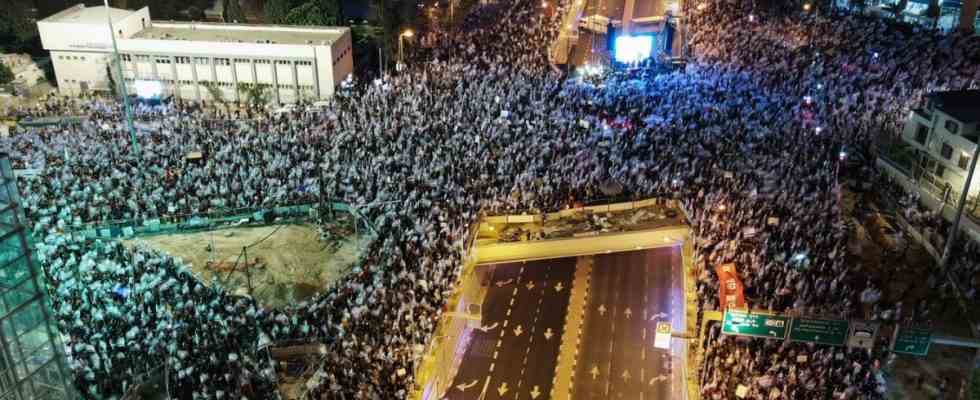A struggle for democracy has been raging in Israel for ten weeks. Last Saturday evening, more people gathered on the streets in all parts of the country than ever before to demonstrate against the government’s controversial judicial reform. The organizers speak of a record. According to the Israeli daily hairnet they estimate that up to 500,000 people took part in the protests. It was the largest demonstration in the country’s history.
According to plans by the right-wing religious government of Prime Minister Benjamin Netanyahu, parliament should in future be able to overturn decisions of the highest court with a simple majority. In addition, politicians should be given more influence in the appointment of judges. The proposed law could also play into the head of government’s hands in a corruption trial that has been going on against Netanyahu for some time.
Netanyahu and the ministers in his government discredit the demonstrators as “anarchists”, although Likud supporters, religious and right-wingers have long been taking to the streets. Even in the Jewish settlement of Efrat in the West Bank, there were demonstrations over the weekend against the judicial reform. They all reacted to the TV speech by President Isaac Herzog.
The words chosen by Israel’s President on Thursday, who is actually obliged to remain politically neutral as a result of his office, were unusually clear. “What is happening here is a tragedy,” he said. The planned judicial reform is destructive and endangers democracy. The draft must be dropped immediately. “It’s wrong. It’s destructive. It undermines our democratic foundations,” said the President. He emphasized that weeks of behind-the-scenes talks had brought the two sides closer to an agreement. “History will judge you. Take responsibility, now,” he appealed to politicians from both camps at prime time on Thursday evening.
A compromise proposal aims to maintain a balance between the branches of government
According to reports from Jewish general President Herzog wants to mediate and has worked out a compromise proposal that should guarantee the inviolability of the Supreme Court and at the same time enable a policy “that puts the citizens first”. But such a compromise seems difficult to imagine. Netanyahu’s coalition is poised to push through the reform in the coming days, even before parliament pauses in anticipation of the upcoming Passover holiday from early April.
In addition, the reform of the judiciary is a core promise with which the right-wing national and in some cases right-wing extremist coalition parties went into the election campaign. For years they have claimed that the Supreme Court has excessive powers that need to be curtailed. “If they don’t manage to do that, then the right, as it sees itself, has failed,” says Peter Lintl in a phone call to the SZ. He is an Israel expert at the Stiftung Wissenschaft und Politik in Berlin.
In recent weeks, a cross-party alliance of resistance has been formed in Israel. In addition to representatives of civil society, banks and business, army reservists have now spoken out against the planned judicial reform. Even in the camp of those who supported Netanyahu’s Likud party in the last election, the voices of opponents are increasing. “That’s not why I voted for Likud,” read the signs posted by many demonstrators. Even the security apparatus does not hold back when it comes to criticizing government policy. Israeli police chief Kobi Shabtai publicly described last Thursday’s immediate dismissal of Tel Aviv police chief Ami Eshed as a mistake. Eshed was fired by Security Minister Itamar Ben-Gvir for allegedly being too lenient with the demonstrators by the Tel Aviv police. The dismissal, which had caused great outrage, was initially reversed by Israel’s Attorney General.
The pressure on Benjamin Netanyahu to reach an agreement is increasing
The fact that the president is now publicly speaking out against the judicial reform is increasing the pressure on Benjamin Netanyahu to reach an agreement. “The Office of the President is the only institution in the country that still enjoys the trust of both sides,” says Lintl. Herzog’s statement has weight and is a piece of the puzzle that could help to find an early agreement. The situation seems deadlocked, the government at a standoff. A compromise, especially if reached at the President’s urging, could save face for Benjamin Netanyahu and his coalition partners.
But what happens if no compromise is reached? According to Peter Lintl, there are two scenarios: “If the government goes through with these plans to overthrow the Supreme Court, there could be a constitutional crisis in Israel,” he says. The court would declare many points illegal, and in the end the question would remain: Who in the country has the decision-making power, the governing coalition or the court? If the governing coalition gives in, it is possible that the young coalition led by Benjamin Netanyahu will fail.
It is questionable whether a compromise could give Netanyahu the support of his strictly religious and extreme coalition partners and thus his own power base. “If not, then that has far-reaching consequences in many ways,” says Lintl. Since the fronts in the opinions are very hardened, it is difficult to predict what will happen next. Benjamin Netanyahu at least commented on the President’s appeal in a public speech from Rome, where he met his counterpart on a short visit, and praised Isaac Herzog’s efforts to bring about an agreement. Opposition leader Jair Lapid of the liberal Future Party also emphasized that he agrees with Herzog’s call for the legislative process to be frozen and supports his call for “detailed and real negotiations”.
Hundreds of thousands of people, including students, will again demonstrate across Israel on Monday, partially paralyzing public transport. And if Netanyahu travels to Berlin this week as planned, he will also face strong criticism of his reform plans in Germany: Several thousand Israelis want to demonstrate against him and his government plans in front of the Brandenburg Gate.

